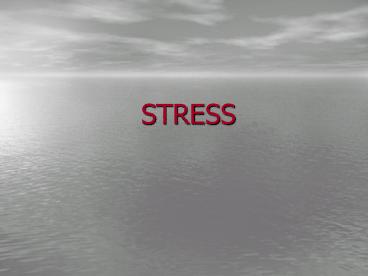STRESS - PowerPoint PPT Presentation
Title:
STRESS
Description:
STRESS Stress an estimated 75-90% of visits to primary care physicians are for stress- related issues and problems job stress is a major source of stress in adults ... – PowerPoint PPT presentation
Number of Views:237
Avg rating:3.0/5.0
Title: STRESS
1
STRESS
2
Stress
- an estimated 75-90 of visits to primary care
physicians are for stress- related issues and
problems - job stress is a major source of stress
- in adults
- children, teenagers, students, and the elderly
are also feeling more stress
3
4
(No Transcript)
5
Stress
- what causes you stress?
- identify your major stressors
- what happens when you are under stress?
- what is all this stress doing to you?
6
Types of Stressors
- psychological issues
- environmental concerns
- poor nutrition
- role conflict/ambiguity, multiple roles
- sociological, political, ethnic, cultural issues
- physical illness/disability
- biomechanical (repetitive strain)
- developmental issues
7
FIGHT OR FLIGHT
- contemporary stress more pervasive,
- insidious, and persistent
- this reaction stems primarily from psychological
rather than physical stress - and causes ingrained and immediate reactions
that were originally designed to help us in
emergency situations
8
The Stress Reaction
- heart rate and blood pressure increase
- there is also increased blood flow to the brain
for decision-making activity - blood sugar level increases for more energy
(glycogen released) - blood is shunted from G/I tract to large muscles
for strength to fight or take flight - clotting occurs quickly to prevent blood loss
9
The Stress Reaction
- adrenaline, cortisol and other stress hormones
are released into the bloodstream - the mouth becomes dry
- the immune symptom is dampened
- the skin is cool due to sweating
- the scalp tightens
10
The Stress Reaction
- this reaction is fine when confronted with a
sabre-tooth tiger, but in the modern world is not
adaptive - today, most of our stress is psychological
- and not physical in origin (for example,
getting stuck in traffic or taking an exam)
11
(No Transcript)
12
JOB STRESS
- -occupational pressures are responsible for30
of workers suffering from back pain-28
complaining of "stress"-20 feeling very
fatigued-17 experiencing muscular pains-13
with headaches
13
(No Transcript)
14
Workplace Stress
- damages relationships
- reduces job satisfaction
- reduces productivity
15
Work Stressors
- lack of participation in decisions affecting you
- unrelenting/unreasonable demands
- poor communication conflict resolution
- lack of job security
- long hours lots of time away from home
- office politics and conflicts
- wages dont equal level of responsibility
16
Physiologic Effects
- inability to adapt to stress is associated with
depression anxiety - stress may disrupt serotonin (well being) levels
- acute stress associated with higher risk of
- heart arrhythmias heart attacks
- fat released into bloodstream
- increases cholesterol levels
- chronic stress in women may reduce
- insulin levels
- muscle and joint pain
17
Conditions Increasing Susceptibility to Stress
- poor early nurturing
- personality traits
- genetic factors
- immune system diseases can impair
- response to stress
- the longer and more intense the stress,
- the more harmful
18
Those At Higher Risk
- in the young and the elderly, stress may go
unnoticed or be ignored - women more than men
- working mothers encounter more stress due to
greater and more diverse work load - divorced or widowed people
- the unemployed
- urban dwellers more than suburbanites
19
ELDERLY
- often exposed to major stressors
- medical problems
- loss of spouse and friends
- change in living conditions
- financial worries
- loss of control
20
CAREGIVERS
- of physically or mentally disabled families face
chronic stress - spouses of disabled partner have more
stress-related problems
21
ANGRY PERSONALITIES
- less emotionally stable or those with
- high anxiety may catastrophize
- there is an association between anger,
irritability, hostility and narrowing of the
arteries - also being self-conscious in public and
suppressing anger - combined with low social support, the situation
is worse
22
Strategies to Help Deal with Stress
- a healthy lifestyle, good nutrition/exercise
- cognitive-behavioral therapy
- identifying stress and learning to relax
- attitude grant me the serenity to accept the
things I cannot change, courage to change the
things I can, and the wisdom to know the
difference.
23
SELF-EFFICACY
- efficacy is the capacity
- to accomplish tasks
- self-efficacy is the perceived ability to handle
problems overcome hardship - stress is minimal when you can look upon problems
as opportunities to overcome adversity gain
experience
24
Perception Assessment
- keep it in perspective
- ask yourself, what is the worst
- that can happen?
- can we look for an unexpected benefit?
- assess the situation, consider past experience
- problem-solve (take action)
- make a decision regarding action
- vs acceptance of the situation
25
Risk for Burnout
- having lofty ideals
- getting impatient/annoyed frequently
- only your ideas areright
- blaming yourself (shoulds)
- tendency to blame others
- feeling you have to do everything yourself
- equally upset about minor hassles
- feeling you have more to do and less less time
26
Burnout Stages
- Stress Arousal Stage
- Stress Resistance Stage
- Severe Exhaustion Stage
27
Stress Arousal Stage
- persistent irritability and anxiety
- bruxism and/or insomnia
- occasional forgetfulness and /or
- inability to concentrate
28
Stress Resistance Stage
- absenteeism or tardiness at work
- tired fatigued for no reason
- procrastination indecision
- social withdrawal cynicism
- resentful, indifferent, defiant
- increased use of coffee, alcohol,
- tobacco, etc.
29
Severe Exhaustion Stage
- chronic sadness or depression
- chronic mental physical fatigue
- chronic stress related illnesses
- (headache, stomach ache,
- bowel problems)
- isolation, withdrawal, and
- self-destructive thoughts































